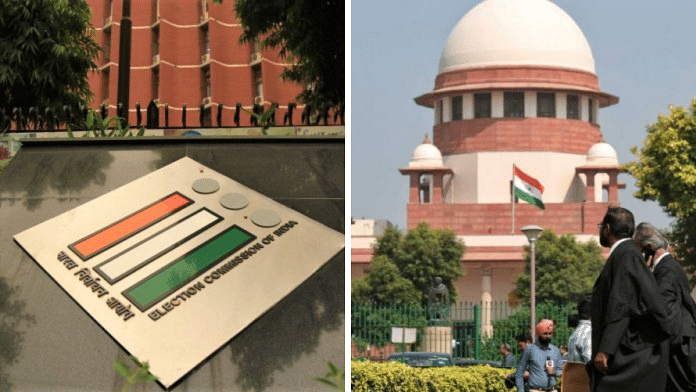New Delhi: The Supreme Court Friday disagreed with the Election Commission of India’s (ECI) claim that the court had settled issues surrounding the disclosure of data given in Form 17C, which deals with a record of votes polled in a polling station.
“Let me tell you a secret. When my brother judge asked me if this (Form 17C) was decided, I said no,” remarked Justice Dipankar Datta.
The judge, along with Justice S.C. Sharma, was hearing a 2019 petition filed by Trinamool Congress leader Mahua Moitra and the civil society group Association for Democratic Reforms (ADR)’s recent interim application that sought public disclosure of the total votes polled as well as uploading of Form 17C for the ongoing Lok Sabha elections.
While the judge’s remark was an oral observation, it is significant because the ECI has opposed the ADR’s application on the ground that the non-profit group suppressed the fact that an SC judgement on EVM-VVPAT, delivered last month, had dealt with the issue on Form 17C.
The judgement had refused to order physical verification of each vote cast through an EVM. Incidentally, Justice Datta was part of the bench that pronounced the verdict. Justice Sanjiv Khanna headed it.
In an affidavit filed before the apex court Wednesday, the poll panel declined to reveal the data as sought by ADR and criticised the organisation for re-igniting a “settled” issue. An application amid the elections, ECI argued, was to create doubt about the electoral process as well as the commission.
Form 17C is the statutory record of votes polled in a polling station. The Conduct of Election Rules, 1961, mandates that the presiding officer of a polling station prepare an account of votes recorded in Part I of the form, and the returning officer records the number of votes in favour of each candidate in Part II.
On Friday, ECI counsel Maninder Singh questioned the maintainability of the application filed by ADR on the ground that the EVM-VVPAT judgement delivered last month covered the issues raised in it.
Singh said the application was based on “unfounded suspicion” and “false allegations”. Even otherwise, he added, the application deserved to be dismissed because it suppressed the facts about the EVM-VVPAT judgement.
He quoted comments that were made against ADR in this judgement and said its latest application compounded the malafide intentions written in the assertions made before the court.
Singh also refuted the ADR’s argument that there was a variance of 6 percent in the final data of the figures published for the first two phases of the Lok Sabha polls. He added the variance was only 1 to 2 per cent.
Singh’s submissions led the bench to pose some tough questions to ADR’s counsel, senior advocate Dushyant Dave. Given the application was filed only at the end of April, the bench asked him why it wasn’t done before 16 March, when the election was notified. It asked Dave whether there was a nexus between the application filed by ADR and another filed by TMC leader Mahua Moitra in 2019.
Dave responded, saying the cause for filing the application arose only when the ECI delayed disclosures of the voter turnout.
The court then pointed out that the prayer asked for in ADR’s application was similar to Moitra’s petition. And in case the application was allowed, it would amount to giving a final decision in the petition, which, the judges said, cannot be done when elections are on. “In between elections, a hands-off approach has to be taken,” the bench said, directing the listing of the application with Moitra’s petition.
But when Moitra’s lawyer, Abhishek Manu Singhvi, varied with Singh’s interpretation of the top court’s EVM-VVPAT judgement to say it did not deal with the aspects of Form 17C, Justice Datta said he held a similar view. “It was discussed, but not decided,” the judge opined.
However, the court did not include this observation in its order by which it deferred the hearing on ADR’s plea. It also said verbally: “Tomorrow is the sixth phase, five phases are over. This particular compliance that you are insisting upon would require manpower, it is not possible during this period. We have to be very conscious of the ground reality, we feel this could be heard after the vacation.”
(Edited by Tikli Basu)
Also read: ‘Why can’t it be made public?’—SC tells EC to respond to plea for release of data on votes polled



